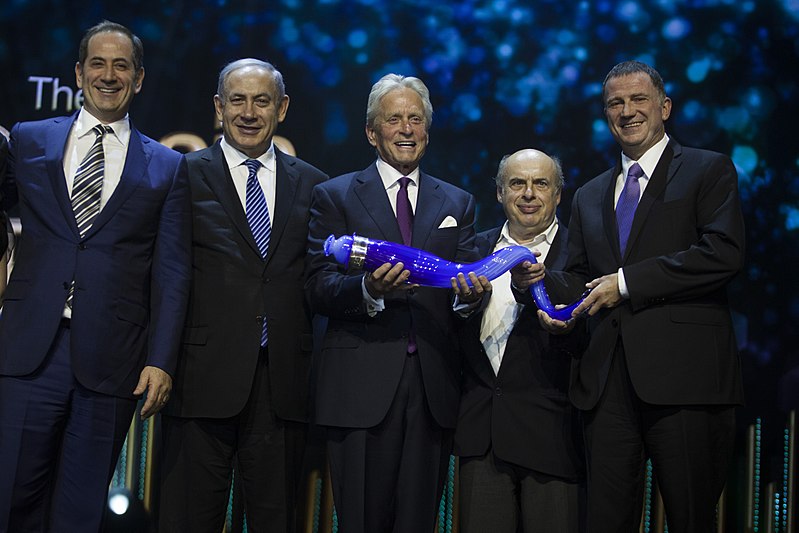If the Genesis Prize was hoping for more media attention for its annual awards ceremony this year, it certainly is going to get it. By announcing that they are sticking with their selection of New England Patriots owner/philanthropist Robert Kraft as this year’s winner of the award dubbed the “Jewish Nobel Prize,” the Genesis committee has ensured that the event scheduled to be held in Israel in June will get more publicity than they dreamed of, albeit not entirely of the type they wanted.
Kraft, whose extraordinary generosity to Jewish causes and devotion to Israel is well-known, deserves all the philanthropic awards that can be thrown at him. But after being charged by Florida authorities for paying for sex in connection with a sting operation aimed at halting a prostitution ring, he has also become fodder for both tabloid gossip and personal criticism.
Kraft’s popularity and personal ties to those involved with Genesis are also causing it to regard loyalty to him as a higher priority than concerns about tarnishing it. So their announcement has inextricably tied the award to a tabloid scandal and made it impossible for the Jewish world to avert its eyes from this tawdry kerfuffle, as those who care about the causes Kraft has supported would have liked to do.
How should the Jewish world react to this controversy? There are two main questions to consider in thinking about Kraft and Genesis.
The first issue revolves around how we should treat those who do great good deeds, but may also be accused of wrongdoing.
The second speaks to a broader concern about the utility of a “Jewish Nobel Prize” at all, and whether going through the annual exercise of selecting a Jewish celebrity to be honored in this fashion does the community much good, no matter who the recipient is.
As for what we’re supposed to think about Kraft, serious observers should avoid both going overboard in condemning him or seeking to excuse such misbehavior.
Kraft is entitled to a presumption of innocence. But those seeking to treat this incident as of no importance because they wish to defend him should be careful not to minimize how serious a transgression human trafficking is and to remember that anyone associated with it doesn’t deserve sympathy.
We’re all human, and Kraft is as entitled to forgiveness for transgressions as anybody else, providing they are willing to come clean and apologize. Personally, I’m not comfortable with a culture of outrage that dominates our society in which a bad statement or tweet or even some non-criminal misbehavior should mean someone should loses their livelihood or be condemned to permanent shunning without hope of redemption. The same is true for someone in the kind of legal pickle that Kraft finds himself in, especially when the accused has done so much good. If you must judge Kraft, then he deserves to be judged by the totality of his life’s work.
But this story also highlights what’s wrong with the whole concept of a “Jewish Nobel Prize.”
The idea of bringing attention to the pride a famous award recipient has in being Jewish and all that they’ve done for the community sounds great. So many Jews are drifting away from both communal life and the effort to sustain it that drawing attention to prominent examples of those who remain devoted to Jewish values is a good idea.
However, as is inevitable in any award that is so subjectively determined, Genesis has found itself involved in politics and scandal. That was the case last year when it honored actress Natalie Portman, and she refused to attend the ceremony lest anyone think she approved of the policies of Israeli Prime Minister Benjamin Netanyahu.
Of the half dozen who have gotten the Genesis Prize since it was initiated, perhaps only violinist Itzhak Perlman, a truly inspirational as well as a beloved performer, might be considered universally acclaimed. Embracing either the celebrity formula like actor/producer Michael Douglas or the more familiar big-giver model, such as billionaire and former New York City Mayor Michael Bloomberg, each provides its own set of pitfalls.
In either case, attempting to place so much importance on one individual is a distraction from the necessity to breathe new life into failing institutions. What the Jewish world needs is not one more vehicle for applauding people who are already famous and honored. That comes off—as the Genesis Prize does even when it avoids controversy—as just another publicity stunt, even if the purpose is good.
We already spend far too much time caring about celebrities and the wealthy, with charitable groups kowtowing to the whims of individuals and their aspirations to be recognized when what’s really required is a focus on the ordinary work that our communal organizations (and all those folks associated with them) try to do to keep Jewish life going and to stand up for Israel, as well as against anti-Semitism. If we gave as much publicity to honoring an exemplary Jewish teacher or organization as we do to a “Jewish Nobel” driven as much by fame as it is by good deeds, we might do more to inspire Jewish youth (Genesis’s purpose), who tend to regard the attention given celebrity-driven ceremonies with the sort of cynicism that is already killing Jewish life.
It would be far better to embrace a more intellectual model for a Jewish award—one not based on worshipping the rich and famous. As much as we should applaud the longtime work that brought Kraft this honor, I find it hard to be enthusiastic about any prize that is stuck in the same old and failed philanthropic paradigm that long ago ensured that so many of our young people would ignore and reject the organized Jewish world.

























